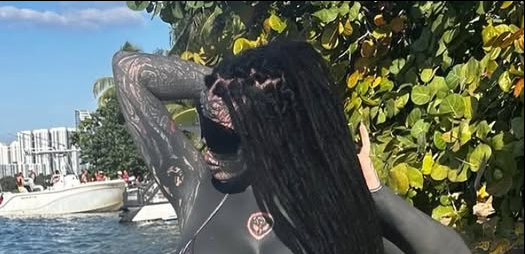For most people, tattoos are a form of art — a way to express themselves, preserve memories, or celebrate individuality. For others, they carry cultural or spiritual significance, symbolizing beliefs, struggles, or identity. Yet body modification remains controversial in many places, sometimes even taboo. Few challenge those limits as boldly as Toxii Daniëlle, a woman who has pushed self-expression far beyond conventional boundaries.
Toxii isn’t just heavily tattooed — she is among the most modified people in the world. Her body is a canvas of transformation: nearly every inch of her upper body is covered in solid black ink, her tongue is split like a serpent’s, and beneath her skin are silicone implants that subtly reshape her body. Most striking of all, she surgically removed her nose — preserved carefully in a jar.
This isn’t a stunt or an accident. It’s deliberate self-definition. With over 155,000 Instagram followers, Toxii shares her modifications with unflinching honesty — no filters, no apologies. Her posts spark admiration and outrage alike. For some, she’s a symbol of artistic freedom; for others, a cautionary tale.
In a recent interview with street artist Devon Rodriguez, the question on everyone’s mind was obvious: Why? Toxii’s response was simple and striking: “Because I like to be imperfect. Imperfections make you unique.”
For her, body modification isn’t about chasing conventional beauty. It’s about rejecting limits, reshaping herself into a form that feels authentically hers — even if it shocks others. She admitted that removing her nose was the most painful procedure she had undergone, yet she preserved it in a jar alongside other altered body parts, honoring each stage of her evolution.
A throwback photo she shared of herself before the tattoos, implants, and nose removal left followers stunned. Comments ranged from shock and disbelief to admiration. Some accused her of self-destruction; others praised her bravery. One follower summed it up: “She’s living her truth. That takes more courage than most of us will ever have.”
Toxii herself stays calm, replying simply: “I’m not trying to be beautiful for anyone else. I’m trying to be free.” For her, physical transformation mirrors her inner identity. Tattoos and modifications translate her inner self into tangible form.
Extreme body modification is painful and risky, yet she insists each procedure brought her closer to peace. “It’s not about pain,” she explained, “it’s about transformation. The body heals, but the mind changes with it.”
Her story challenges society’s limits of individuality. We celebrate self-expression only when it’s socially acceptable; when it challenges norms, it becomes controversial. Toxii exposes that tension, showing how far one can go to define themselves.
Despite criticism, she radiates confidence and control. Whether posing in soft light or standing under harsh shadows, she owns every inch of who she has become. The irony is striking: people call her “inhuman,” yet her journey is profoundly human — an externalization of the struggle to become truly oneself.
Toxii once captioned a photo, “I’m not chasing beauty. I’m becoming art.” Disagree or recoil if you wish, but her commitment and courage in reshaping her body and life on her own terms are undeniable.
In four years, she transformed from an ordinary young woman into a living embodiment of her vision. Whether seen as madness or mastery, her story is a reminder of the power and polarizing nature of human freedom.
In a world obsessed with perfection, Toxii Daniëlle chose to be deliberately imperfect — and perhaps that is the most radical act of beauty of all.
